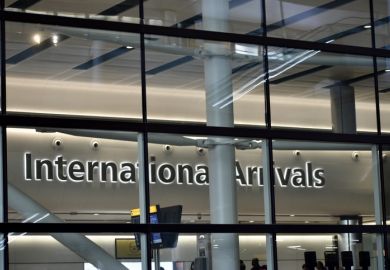American universities are “trapped in a recurring cycle of attacks on Israel and defences of it”.
That is the view of Cary Nelson, jubilee professor of liberal arts and sciences at the University of Illinois at Urbana-Champaign, who spoke to Times Higher Education from Jerusalem as he helped to lead a group of faculty on a peace tour.
Although he said that he supported the existence of Israel and, in 2014, co-edited with Gabriel Noah Brahm a book called The Case against Academic Boycotts of Israel, he got annoyed that “if you are a ‘supporter of Israel’, people assume they know what your position is. I commonly get people who are completely astonished that I’ve argued for unilateral withdrawal from the West Bank.”
Although he accepted that the Boycott, Divestment and Sanctions (BDS) movement has supporters elsewhere, Professor Nelson suggested that it is “noisiest and most visible” in universities, where it has led to almost unprecedented – and worsening – levels of acrimony.
“I have not found another issue that destroys relationships,” he recalled, “and produces a kind of intolerance I haven’t seen since the Vietnam War. But even then I never encountered people who broke off relationships over political differences on Vietnam. I had a room-mate in college who was in favour of the war, but we got along. My wife’s father was in favour of the war, and we decided not to talk about it, but I loved him dearly.
“This is very, very different. My department head is someone I actually hired when I was chair of the research committee 15 years ago. I brought three books into him one day, two on modern poetry and The Case against Academic Boycotts of Israel, and he wouldn’t touch the last one, let alone open it up.
“There are about 60 faculty members in my department and only two of them left who talk to me on a regular basis. I never raise my voice. It’s important to be civil and calm, but on this issue that doesn’t necessarily get you anywhere.”
His own position – a “mix of wanting to better the lives of Palestinians, which is absolutely critical, and to support the existence of Israel” – is now, Professor Nelson admitted, “uncommon”, although “not unheard of”, on campuses.
Yet he also believes that the debate would be far more productive if it were “better informed”. It is this that has led him to produce what he describes as “a kind of vade mecum on the issues that seemed most pressing for the conflict”, titled Dreams Deferred: A Concise Guide to the Israeli-Palestinian Conflict and the Movement to Boycott Israel.
This features short, sharp chapters exploring topics ranging from “anti-imperialism”, bi-nationalism” and “cultural boycotts” to “the West Bank”, “Yom Kippur War” and “Zionism”.
It remains to be seen whether the book can help lower the temperature of campus screaming matches about Israel-Palestine.
Cary Nelson’s Dreams Deferred: A Concise Guide to the Israeli-Palestinian Conflict and the Movement to Boycott Israel has just been published by the Modern Language Association Members for Scholars’ Rights and Indiana University Press.




